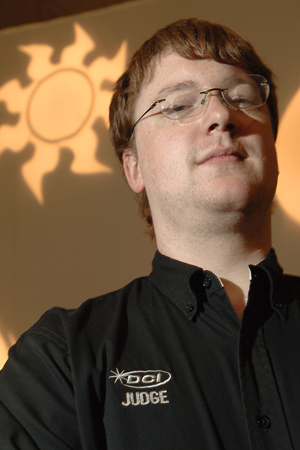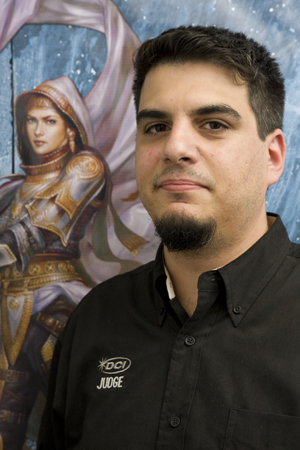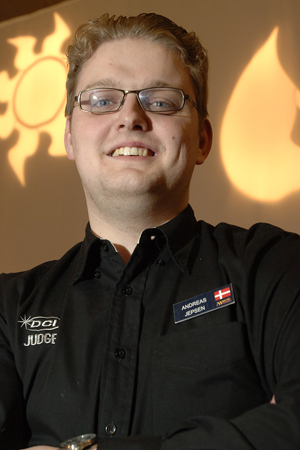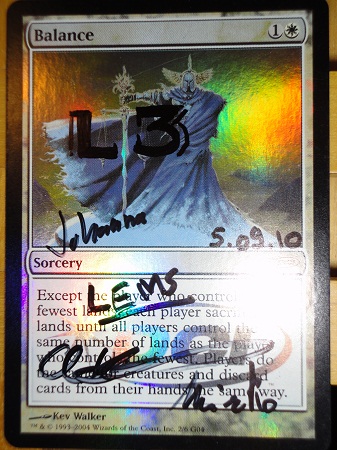Pro Tour Amsterdam is in the books, and the DCI Family has a whopping
three
new Level 3 judges in its ranks! Let’s find out more about who these great guys are, and ask about how they made it to Level 3.

David Lyford-Smith
Question:
Hi, David!
Please introduce yourself.
David Lyford-Smith
: Well, I’m David Lyford-Smith. I’m a twenty-five year-old accountant from Reading, in southeast England. I have three sisters and live in a house of 1.5 Magic players and me.
Q
: 1.5? Sounds like a story.
DLS:
There’s one active player (aside from me, of course), and one casual player.
But between us,
we have five combined judge levels!
Q:
That’s a high judge level house, right?
DLS:
Yup; I think we are probably the highest judge level house in the country. Before Amsterdam, we were tied with wherever Nick Sephton (L4) went, but now we’re ahead.
Q:
How did you get into Magic? When did you start playing and judging?
DLS:
I learnt to play from a very good friend called Ezra at school. Prophecy was the current set and he’d been playing in Seattle since
he
was young — like 1994. I got interested in judging when I started living with my friend Calum, one of the L1s I still live with now, and I certified for L1 at Grand Prix Krakow 2008. Basically, I’d gone there at the last minute to try and use some byes I’d won, and went 0-3, so I thought: “What else can I do with a free weekend and when I am clearly bad at Constructed?”
Q:
And you saw the “JUDGE CERTIFICATION” sign.
DLS:
It worked!
I was tested by L2 George Trichopolous and L2 Trainer Jurgen Baert, and then was thrown straight into my first proper event, where I worked with Graham Theobalds.
Q:
Lorwyn. What an amazing block to start judging.
DLS:
Oh yes, I missed the weird old Penalty Guidelines, and came in just when the judge program was starting to really come into its own. I’d played Astral Slide and morph decks a lot when I started to play in tournaments around Onslaught, and that’d taught me a lot about timing and rules things.
Q:
Looks like you got into judging in the first time because of rules interactions.
DLS:
I was interested in doing something for my community, and using my rules knowledge. I’d come to realize that I’d never be a great Constructed player, and opportunities for Limited play were, well, limited.
Q:
Now you are a L3 judge, I’m pretty sure you’ve gone a long way, and sure you have attended lots of events.
DLS:
Oh for sure. I missed all the layers questions on my L1 test — but now I’ve been to four Pro Tour events and six Grand Prixs.
Q:
Layers: the boogie man!
DLS:
Heh!
Q:
What’s your favorite event so far?
DLS:
I think for me it has to be Pro Tour Kyoto. I’d just started to really take my judging seriously, and was a fresh L2. I’d wanted to attend a Pro Tour for seven years — so
that
was my first — and I’d wanted to go to Japan for ten years. So that’s seventeen years of anticipation released at once — and I ended up at a great event, meeting all sorts of awesome people, at the most wonderfully Japanese city there is. It was a truly amazing experience.
Q:
Kyoto was awesome, I met you there!
DLS:
That was pretty much the only downside, yeah 😉
Q:
How do you fit judging lots of events in your work/school schedule?
DLS:
Local events are strictly weekends and evenings, which is easy enough, I use one or two days of holiday time whenever I’m travelling to a European Grand Prix, and a week or so if I want to make a Pro Tour.
Magic is my main social activity, so donating the time to it doesn’t feel like a chore. Even at a tournament half way around the world, I know there’ll be people I know there — and that the people I don’t know I’ll have an easy time talking to, because we’re both there for the love of the same thing.
When I’m busy at work — for accounting, that means February to May — I basically can’t attend international events, which is a real shame. But other than that, work is good and flexible with holidays.
Q:
Tell me about your judging;
what’s your greatest skill?
DLS:
My rules knowledge is great, but I think that the skill I’ve come to most appreciate is awareness. With experience of events, you start to
feel
problems before they happen.
Q:
You were playing at Grand Prix Gothenburg; how important is for you to play regularly in order to be a good judge?
DLS:
It’s essential. It’s very easy to forget how different things are for players, even though you’re at the same event in the same room.
Q:
As a player, what’s your greatest accomplishment?
DLS:
I won a County Champs a few years back playing Battle of Wits, which was a personal goal. In raw numbers terms, making Day 2 of Gothenburg was the height for me.
Q:
Any epic fail you’d like to share?
DLS:
Weeeeeeeeeeell… I did misregister the Battle of Wits deck. I put Dimir Signet down twice, because the list went on to three pages and I didn’t notice.
Q:
Is Battle of Wits your favorite card?
DLS:
I think the challenge of the deck was what I liked. My favorite cards to play are things like Balance, Scroll Rack, Crystal Ball, Astral Slide, Enigma Sphinx — but favorite Magic character is Volrath the Fallen, both as a Legend, a Vanguard card, and what he’s like in the story and art.
Q:
There are some different color-alignment theories for players and judges; where do you fall into?
DLS:
I am very much white — but
in my judging, I am more white-green, with the community angle.
Q:
As we all know playing is fun, but so is judging. Tell us about the funniest moment you lived at an event.
DLS:
Well, that has to be the Best Appeal Ever. A player asked the floor judge (Stelios Kargotis) to leave the table so he could talk to his opponent alone. When Stelios said no, he stuck to his guns since he was 100% certain he was allowed to kick the judge off his table and chat in private. So he appealed. By the time I got there as HJ, there were three floor judges and two or three players with judge levels who’d surrounded him; he had about ten levels around him as he tried to explain why this would be okay. Classic times.
Q:
Have any advice for players for their next tournament?
DLS:
As a judge, the advice I’d give is to not rush things that are important — take the time to check your decklist carefully, make sure your sideboard is right before each match, and play clearly.
As a player, the best advice I think there is on playing is to stay relaxed. If you’re desperate or nervous, you won’t play well. Focus on the fundamentals, and don’t overestimate how much of a threat your opponent’s cards are just because they’re expensive or are usually bombs. In some games, Cloud Elemental is more dangerous than Inferno Titan!
Q:
It was awesome to chat with you, David. Thanks a lot and congrats!
DLS:
Always a pleasure.
Oh, and if your readers are in the UK on Sunday, October 3rd, there’s a charity tournament in Reading where you can come play fifteen-card Highlander Standard in support of a charity against youth homelessness.

Adrián Estoup
Q:
Hello, Adrián, please give us a brief self-introduction.
Adrián Estoup
: My name is Adrián Estoup. I am 31 years old, and I live in Temperley, a small city in the outskirts of Buenos Aires. In my real life, I’m a software developer for a Symantec, a computer security company. I’m married and I have a two-year-old daughter, I started playing in Mercadian Masques, and I’ve been a judge since Judgment.
Q:
Wow, that’s a lot of time ago.
AE:
Yeah. The truth is, I only started taking being a judge seriously when I started to attend university. Before that I was more of a player — but because I didn’t have enough time to test with my friends, I decided to invest more time into being a judge.
Once I finished university, I remembered loving being a judge so much I decided to dedicate all my time to wearing the stripes.
Q:
Do you still play Magic regularly?
AE:
Almost everything I play is online — Magic Online drafts and a few events, like prereleases. Sadly, I don’t live near gaming shops and with my family is complicated to handle it all; so whenever I have some time, I sit in front of my computer to fulfill my cardboard addiction.
Q:
Do you travel a lot to judge tournaments?
AE:
I used to travel a lot inside my country to areas where there were no judges, so I could promote the game. The community in the inner areas of Argentina grew and some new judges took root there, which is excellent.
Now, I travel more to Europe or to other countries in Latin America. We don’t have many professional events like Grand Prixs or Pro Tours around here (there wasn’t a single one in 2010) — but for Nationals season, the Latin American judges promote cultural exchange, and travel more.
For example, this year I was in Peru before my European tour — something that I’ve done for the last three years to attend the Pro Tour and grand Prix that are held in adjacent weekends sometime in the year. In ’08 I went to Paris and Berlin, in ’09 to Paris and Rome, and this year to Gothenburg and Amsterdam.
Q:
Tell me about that amazing trip you will never forget.
AE:
Each trip has its own anecdotes. In ’08, I went with my wife and my daughter to reunite with my European family — relatives I hadn’t seen since I was a kid! So that trip has a strong emotional factor to me. Last year I went to Spain, where I met a lot of new friends. And this year, I shared an unforgettable trip with Damian Hiller and Alejandro Raggio, another two Argentinian L3 judges — two great friends who share my passion about judging.
And, well, I certified for L3.
Q:
Sounds amazing to me. What do you do to keep your passion for your family, your work, and the game compatible?
AE:
I am really lucky to have a wife that understands my passion. This is the first weekend I’ve spent at home in the last month! I’m quite grateful to have her, no doubt about it.
At work, I try to schedule my time to make sure that when I am working, I am being productive. This way I can then dedicate about three or four hours a day to do Magic-related stuff, like replying to emails, coordinating initiatives, preparing for events, and so forth.
Q:
What is your greatest moment as a player?
AE:
Making it to the finals of a 150-player PTQ playing a Stompy deck. Everyone else despised it, and they were right — that deck was simply about casting guys and turning them sideways. But hey, I took it to the finals!
Q:
Sounds fun.
AE:
Well, now that I think about it my performance isn’t that impressive — but hey, maybe now I know why I became a judge.
Q:
Any memorable misplays?
AE:
I remember a Nationals Qualifier where I had this play: Forest, go…
Q:
You always playing green!
AE:
Yes! I don’t always play green, but it is a color that I feel comfortable with — and when I started out, I used to play with it all the time. I’m a very impulsive person, and well, the bigger the creatures, the better!
Back to the anecdote: I lead with Forest, my opponent played Darksteel Citadel, and I played another land and Naturalized the Citadel.
My opponent says “Okay — it’s indestructible.”
I read the card, took my entry slip, and dropped from the tournament.
Q:
Ouch!
AE:
I have another one: at Grand Prix Porto Alegre, I lost round 2 to a random guy with a sixty-card card deck. Let’s clarify: the format was Kamigawa Sealed deck. Again, I dropped after that match.
Q:
Thanks a lot for your time, Adrián, and congrats on your L3.
AE:
Thank you, too!

Andreas Q. Jepsen
Q:
Hi
Andreas! Please, introduce yourself to the StarCityGames readers.
Andreas Q. Jepsen:
My name is Andreas Quvang Jepsen, and I’m a twenty-three year-old financial auditor from Denmark. I live in a mid-size city called Fredericia, about two hours from Copenhagen.
Q:
How long have you been involved with Magic?
AQJ:
I played some casual kitchen table magic with some high school mates back in 2004; we played mostly with one of my friend’s older brother’s old cards. It wasn’t until I went off to college that I got my own cards and started playing for real. I went to my local game shop and played some casual, bought a precon, and my first sanctioned event was the Ravnica prerelease.
Q:
What about judging?
AQJ:
Judging wasn’t until much later. Denmark was quite deserted judgewise, and we didn’t have any L3s who could test people (that was back when L2s couldn’t test folks). So it wasn’t until fall of 2008 when I did a walk-up at Grand Prix Copenhagen and got certified.
Q:
Why did you start judging?
AQJ:
At first, it was a matter of making tournaments in Denmark better. As I said, we didn’t really have any active judges, and I felt that having
someone
to enforce the rules would be nice.
But it quickly became much deeper than that. I came for the tournament logistics, but I stayed for the social aspects, the community, the people…
Q:
What’s your best event ever?
AQJ:
My most memorable event is probably my first Pro Tour, which was in Austin last year… getting to travel across the Atlantic for the first time ever and meeting
a lot
of new people — people I had heard so much about, but had never had a chance to meet. There were simply so many experiences from that trip — which was my first time outside Europe. I made a lot of friends and had a blast!
Q:
How do you fit judging lots of events in your work schedule?
AQJ:
Being from Denmark helps; the norm around here is six weeks of paid vacation. (Live the dream, son — T.F.) And then there’s my line of work; being an auditor is very seasonal work, we work our asses off during the first four to five months of the year when every company have to finish up their annual reports, often raking in hundreds of overtime hours. I then spent those overtime hours during the rest of year to go various events.
Q:
Do you usually play Magic?
AQJ:
I try to play whenever I can. I play quite a bit of Magic Online, as it gives me a chance to play when I have the time. It’s also a good way to kill time during travel, going to and from events. I strive to play some paper competitive events as well, since like to keep a connection to the mindset of a player. I don’t want to become obsessed with the letter of the law; sometimes, thinking as a player can help you become a better judge.
Q:
I heard you have a favorite card.
AQJ:
Yeah — this one!!!

Q:
There’s a story here, tell us about it!
AQJ:
Indeed there is. In order to become an L3, you don’t have to
just
pass a really hard rules test; there’s also a lengthy interview (mine took
almost three hours) with several high-level judges. It’s a very intense, educational, and rewarding experience, designed both to assess your readiness
and
to teach you something.
This is a memorabilia of that day, dated and signed by the people on my interview panel.
Q:
What color do you align with, both as a player and as a judge?
AQJ:
I’m white— always have been, always will be. When I started out as a player I was probably red/white, then as I started judging I drifted over into green/white with a splash of blue.
Q:
Have you had any success as a player?
AQJ:
I probably haven’t had that many awesome feats, as I am (like most judges) a quite average player. But one thing that does spring to mind is showing up unprepared for a Nationals qualifier this year; I hadn’t assembled a deck from home, and I saw that “Super Best Friends” — a deck that had just won a SCG Atlanta Open the weekend before — and I just
loved
the look of that deck.
I had nothing with me except a foil Gideon and a handful of fetchlands. I pulled some strings, borrowed a lot of cards, and did a few trades, so that I built The Most Expensive Deck┢ in Standard in forty-five minutes. I then continued to plow through the tournament, 7-0ing and crushing the top 8 to qualify for Nationals — even though I had no intent on playing, because I had already signed up as a judge.
I feel kind of bad for “stealing” the slot, but I also didn’t want to just concede.
Q:
Tell me about your greatest judging skill.
AQJ:
Inexhaustible stamina and good mood. I’m (almost) always happy, skipping along and being merry. I know a lot of judges can be a little stiff, but I believe that a little smile and whistling a tune can make a long day much more bearable. Sometimes I’m sure some of the players think I’m a nutcase, dancing and singing after twelve hours on my feet dealing with stupid rules questions — but I’m usually really enjoying myself, and being a little happy usually rubs off on people. There’s no reason we can’t spread a little joy while also dispensing justice.
Q:
Thanks a lot, my friend, and well done on getting to L3.
AQJ:
Thank
you
, David for your support, friendship, and the numerous laughs we’ve shared over these last two years.
Q:
Dude, did you have to end the interview like that?
AQJ:
Ob
viously.
Q:
Pero qué random!
AQJ:
Muy random!!!
